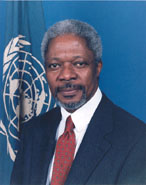Annan opens U.N. debate decrying unjust world economy
Addressing world leaders for the last time as secretary-general, Kofi Annan painted a grim picture Tuesday of an unjust world economy, global disorder and widespread contempt for human rights, and appealed for nations and peoples to truly unite.

As the annual General Assembly ministerial meeting got under way, the 192 U.N. member states faced an ambitious agenda including trying to promote Mideast peace, curb Iran's nuclear ambitions, get U.N. peacekeepers into the conflict-wracked Darfur region of Sudan, and promote democracy.
In a new blow to global stability, Thailand's military launched a coup against Prime Minister Thaksin Shinawatra even as Annan spoke. The Thai prime minister, who was in New York, switched speaking slots with Montenegro so he could address the General Assembly on Tuesday evening, a day earlier than planned.
U.S. President George W. Bush took the podium for a speech aimed at building bridges with people in the Middle East angry with the United States over Iraq and Lebanon. He laid out a vision for peace and assured Muslims that the United States is not waging war with Islam.
On the sidelines, Bush pressed Iran to return at once to international talks on its nuclear program and threatened consequences if they do not.
Bush's speech was less confrontational on that subject. He said Iran "must abandon its nuclear weapons ambitions," and return at once to international talks on its program. The U.S. has threatened sanctions if Iran does not suspend uranium enrichment, reports AP.
Iranian President Mahmoud Ahmadinejad who was scheduled to speak to the body later Tuesday was not in the hall during Bush's address.
Annan, whose second five-year term ends on Dec. 31, said the past decade had seen progress in development, security and the rule of law the three great challenges he said humanity faced in his first address to the General Assembly in 1997.
Subscribe to Pravda.Ru Telegram channel, Facebook, RSS!





